17 Foods High in Vitamin B12
Vitamin B12, or cyanocobalamin, is a water-soluble vitamin. Being a water-soluble vitamin, your body cannot store a large volume of vitamin B12. This means that you have to get it from your diet continuously. Here is a detailed list of 17 foods that are high in vitamin B12.
About vitamin B12
Vitamin B12 naturally occurs in some foods and is added to the others. It is also available in the form of dietary supplements and prescription medication for people, who do not eat meat (vegans and vegetarians) or for people with gastrointestinal disorders affecting nutrient absorption from the gut.
Vitamin B12 exists in several forms. As it contains the mineral cobalt, it also has another name - cobalamin. This nutrient plays an integral role in the proper functioning of the nervous system and the production of red blood cells. It is also involved in many metabolic processes occurring in the human body. It primarily affects fatty acid metabolism, amino acid metabolism, and DNA synthesis.
The beneficial effects of vitamin B12 on the central nervous system are numerous. It keeps the nerve cells needed for neurotransmitter signaling healthy and helps in the formation of the myelin sheath, which is a protective covering for the nerve cells. That is why a deficiency of vitamin B12 might deteriorate your cognitive abilities (1, 2).
The required daily amount of vitamin B12 ideally is 2.4 mcg. For pregnant and lactating females, the recommended daily intakes are 2.6 mcg and 2.8 mcg respectively (3).
The deficiency of this vitamin in the body is characterized by fatigue, constipation, muscle weakness, megaloblastic anemia, weight loss, and the loss of appetite.
Other symptoms of vitamin B12 deficiency might include depression, difficulty maintaining balance, confusion, poor memory, and soreness of the oral cavity. Neurological changes, such as tingling in the hands and feet, are some other manifestations of vitamin B12 deficiency (4, 5).
There is no such thing as too much of vitamin B12. Vitamin B12 can be safely consumed in large doses because the excess amount is stored in the liver for future use or excreted by the body.
Here is a list of the top 17 foods rich in vitamin B12 and some ideas on how you can add them to your diet. So let's get started!
Swiss cheese
Cheese is a delicious and healthy vitamin B12 rich food.
Sure it is high in calories and fat, but it is an excellent source of beneficial nutrients, including vitamin B12.
Among the different varieties of cheese, the Swiss cheese is richest in vitamin B12. One serving of Swiss cheese contains 4.4 mcg or 73% of RDV of vitamin B 12 (6).
It also houses a good amount of calcium and vitamin D. Swiss cheese has low sodium content. But it is very high in saturated fat. One cup of Swiss cheese contains 37 g of fat (7).
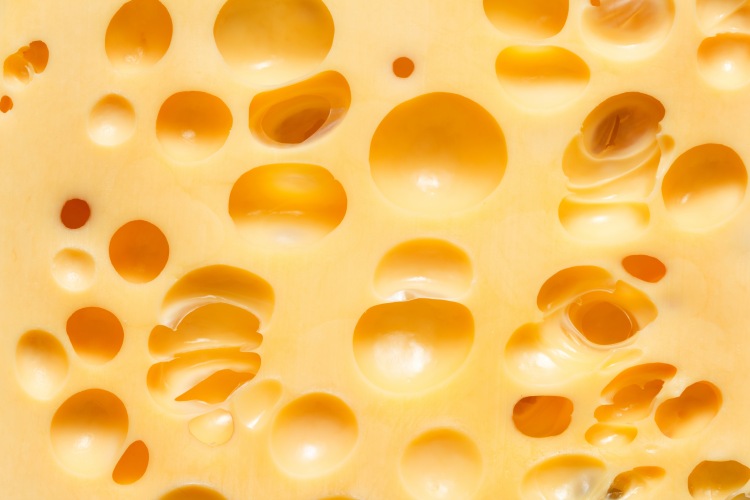
Swiss cheese is high in vitamin B12
Swiss cheese has numerous health benefits. It alleviates symptoms of hypertension and osteoporosis. It also boosts bone health and improves dental health (8).
On the downside, Swiss cheese is quite rich in saturated fat and cholesterol, which increases the risk of cardiac disease (9).
Therefore, you should consume it in moderation.
There are several ways you can add more of Swiss cheese to your diet. For instance, add a slice of Swiss cheese to your sandwich at lunch time or make a grilled cheese sandwich for a light snack.
Clams
Shellfish are typically a great source of many nutrients and minerals, and clams are no different. A single cup (227 g) of clams loads your body with 112 mcg of vitamin B12, which translates to a whopping 1870% DV of this vitamin (10).
A cup of clams also provides 29 grams of protein, 49% of the DV for vitamin C and a whopping 176% of the DV of iron (11).
Clams also have been known to elevate the level of heart-healthy HDL cholesterol in your blood (12).
Even though there are genuine concerns about mercury and toxins in certain species of shellfish such as clams, the benefits of consuming clams far outweigh the risks (13).
Clams are easy to cook. Just season them with some olive oil and toss them on the grill for adding them into a tasty salad or add them to a fresh seafood broth.
Oysters
Oysters are a rich source of vitamin B12, protein, and zinc. They contain 6.8 mcg of vitamin B12 per 100 grams of serving, which translates to 113% RDV (14).
They also contain a good deal of proteins loaded with essential amino acids. A 100 gram serving of oysters adds 22.8 g of protein to your diet. Oysters also carry moderate amounts of niacin and riboflavin (15).
They are also fairly rich in cholesterol (81 mg/ 100 g serving).
Oysters are quite beneficial when it comes to the prevention of cardiovascular diseases. These sea creatures are also rich in antioxidants like omega fatty acids. They strengthen muscles and help prevent colds because they support the immune system efficiently (16).
There is also a general perception that oysters act as an aphrodisiac and increase your libido.
Oysters should be consumed in moderation, though. If you are unsure about their origin, they might be contaminated with poisons like mercury.
Some people are allergic to oysters and other shellfish (17).
If you are allergic to oysters, consuming them might trigger an allergic reaction, which can be life-threatening if severe. Therefore, before you consume oysters, you should make sure you are not allergic to them.
You can enjoy this delicacy by stir frying them. You may also make a seafood broth with oysters or simply grill them.
Mussels
Mussels are not just appetizing but relatively safe to use as well. Besides, they have low mercury content.
Mussels are loaded with vitamin B12 as a cup (150 g) of mussels can provide you almost 18.0 mcg of vitamin B (300% DV) (18).
That's not all!
They also contain a considerable amount of vitamin C, iron, and zinc.
They are high in sodium content and cholesterol, though.
A serving of mussels holds 429 mg of sodium (19).
Mussels have many beneficial effects, including improving nervous function and reducing inflammatory conditions, such as arthritis. Plus, they are chock full of essential minerals, such as zinc, which helps boost immunity (20).
Moreover, high zinc levels have also been linked to increased testosterone production, improved libido, and better sperm count in men (21).
If you have any heart condition, consume mussels carefully due to their high sodium and cholesterol content. Contaminated mussels may result in shellfish poisoning (22).
Sprinkle some lemon juice over grilled mussels and add them to a salad or steaming seafood broth to give your immune system a boost.
Beef
Beef is an excellent source of vitamin B12. A 100 g serving of beef provides 50% of DV of this nutrient (23).
It also contains other beneficial nutrients such as zinc (3.8 mg), protein (19 g), iron (1.9 mg) and phosphorus (178 mg).
On the downside, it has a high saturated fat content (6 g per 100 g) which is bad for health (24).
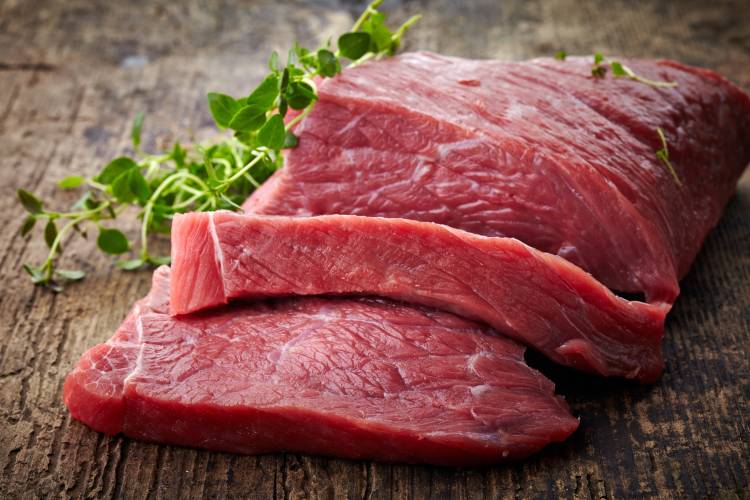
Beef meat contains lots of vitamin B12
Vitamin B12 and iron present in beef are beneficial for the prevention and treatment of anemia.
Beef assists in maintaining the health of red blood cells. It is also useful for healthy brain functioning and the production of hormones (25).
The high-fat content in beef is injurious to cardiac health and excessive consumption of red meat may lead to heart disease and colon cancer (26).
Beef is a traditional component of meals. Grill a beef-steak on a sunny weekend or have a beef burger at lunch time with some green veggies. Beef stew is also a nutritious dish.
Chicken
Chicken is a great source of vitamin B12, even better when consumed with its skin. A 100 g chicken piece with skin contains 0.31 micrograms of vitamin B12 (6% DV) (21).
It is also loaded with protein (18 g), phosphorus (150 mg), and selenium (14.4 mcg) (28).
Chicken has high-fat content and contains 9 g of fat per 100 g of serving (29).
Chicken is a healthy alternative to red meat for people who eat meat with gusto. Chicken contains lesser amounts of fat and cholesterol compared to red meat (30).
Chicken is also rich in folate and folic acid.
However, you should be careful about the consumption of processed chicken meat. The processing and growth of chicken use antibiotics, chemicals, growth hormones that may increase the risk of cancer, salmonella infection and heart disease (31).
You can incorporate chicken into your diet in several ways. Grill it, roast it, fry it or boil it. Chicken soup is a nutritious dish for cold days.
Boil and shred some chicken and place it between two bread slices along with some lettuce and tomatoes to make a light, healthy snack.
Eggs
Eggs are chock full of vitamin B12 and protein. The egg yolks contain most of the vitamin B12.
One serving of eggs contains 0.6 mcg of vitamin B12 (9 % DV) (32).
Eggs are a fantastic dietary source of protein (5.5 g), phosphorus and selenium.
They have high cholesterol content (1028 mg/serving) (33).
Besides being rich in vitamin B12, eggs are an inexpensive, high-quality source of protein (34).

Eggs are rich in vitamin B12
They improve muscle strength, are a powerhouse of energy and make hair stronger and healthier.
Due to their high cholesterol content, they are considered unsafe for heart patients (35, 36).
Now doctors think that moderate consumption of eggs is quite beneficial for health.
Eggs are a favorite breakfast item. Eat a boiled egg, omelet or scrambled eggs every day for breakfast to give your vitamin B12 levels a boost.
Milk
Milk is a rich source of vitamin B12, calcium and vitamins A and D.
Drinking only 1 cup of milk gives you 0.9 mcg of vitamin B12 (15% of daily value) (37).
Individuals who are lactose intolerant can take soy milk as an alternative. It contains 41% calcium and 9% vitamin A (38).
Non-skimmed milk is high in saturated fat (11 g/serving).
Milk has many nutritional benefits. It makes your bones and teeth healthier (38).
Excessive consumption of non-skimmed milk may result in vascular disease and diabetes (39).
Add milk to your breakfast cereal or simply drink a glass of milk every day to increase your vitamin B12 intake.
Crab
Crabs are a good choice for incorporating vitamin B12 to your nutrient intake as their vitamin B12 content is 9.0 mcg/100g of serving.
This translates to 150% of the DV of vitamin B12 (40).
They are also excellent sources of vitamin A (150 IU), vitamin C (7.0 mg), zinc (2.8 mg) and protein (18 g).
Crabs have a high sodium and cholesterol content, though.
Crab meat has a sweet and succulent taste, which makes it a savory dish. It also has some remarkable health benefits, such as giving a boost to your cognitive function, protecting the heart, reducing inflammation, promoting bone strength, improving immunity, efficient circulation, and detoxification of the body (41).
Because crabs live in salty seawater, their meat contains a lot of sodium. If you suffer from hypertension or high blood pressure, you are advised to limit your intake of crab (42).
You can add crab meat to a healthy salad or grill them and serve it with a selection of other seafood.
Lamb
Lamb is an excellent source of vitamin B12 (2.3 mcg/ 100 g serving).
This means 39% of DV of vitamin B12 (43).
It also has many other incredible health benefits. Lamb is high in niacin (6.0 mg), omega 3(420 mg), folate (18.0 mcg) and zinc (3.4 mg).
It has a high-fat content (23 g/100 g serving) (44).
Lamb meat helps in reducing oxidative stress. Lamb meat has also been proven to provide relief from inflammation and it helps in boosting your metabolism.
It also assists in balancing blood sugar levels of the body and it is a rich source of protein (45).
Excessive consumption may lead to colorectal cancer or heart disease (46).
Lamb can be eaten in several ways. You can roast it, broil it or make a stew from its meat.
Salmon
If you wish to start on a low-fat, heart-friendly diet, consider including salmon to your weekly meal plan.
Besides being an excellent source of vitamin B12 (3.2 mcg or 54% DV), a 100 g serving of salmon provides 20 g of protein, more than one-third of the recommended daily value (47).
This fish is also a good source of calcium (9.0 mg), providing 19 percent to 24 percent of the recommended daily value.
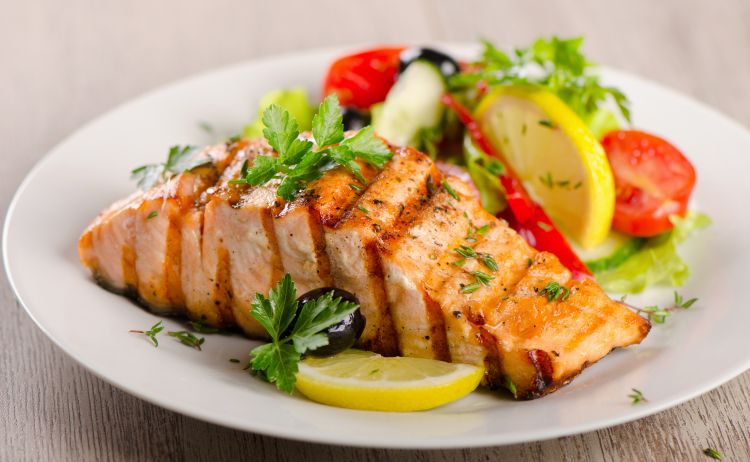
Salmon is rich in vitamin B12 and omega-3 fatty acids
Salmon has anti-inflammatory effects (48).
It helps reduce body-weight and has been found to alleviate depressive symptoms and shield fetal brain health during pregnancy.
It also lowers anxiety, slows age-related memory loss and decreases the risk of dementia (49, 50, 51).
Mix some canned salmon with mayonnaise and vegetables to make a fresh salad.
Trout
Fatty fish like trout are a quality source of vitamin B12, vitamin D and omega-3 fatty acids, which promote brain function and fight inflammation.
This fish contains 7.8 mcg of vitamin B12 in a 100 g serving (103% DV).
Salmon has low sodium content. It is also a rich source of phosphorus (245 mg) and selenium (12.6 mcg), and an excellent source of protein (21 g) (52).
This fish has high cholesterol content, about 58 mg/100 g (53).
The beneficial effects of salmon consumption on early cognitive development and heart health have been attributed to the omega-3 fatty acids present in fish and fish oils.
The toxic substances present in salmon may sometimes adversely affect these health outcomes (54).
The best way to enjoy this fish is to grill and season it with olive oil.
Tuna
Tuna is a good quality source of many beneficial nutrients. As for vitamin B12, a serving size of 100 grams of tuna fish provides 9.4 mcg of vitamin B (157% DV) (55).
It contains many other healthy minerals such as selenium (36.5 mcg), potassium (252 mg) Vitamin A (2183 IU) and omega-3 fats (1298 mg) (56).
Addition of tuna to your diet may assist in combating cardiac disorders, obesity, depression, cognitive decline, cancer, asthma and inflammatory disorders (57).
Mercury present in tuna can harm the developing nervous systems of fetuses and young children and is not recommended for pregnant women (58).
For boosting your daily vitamin B12 intake, make a tuna sandwich as a light snack.
Caviar
All types of caviar (or fish eggs) are packed with essential nutrients.
This delicacy is a potent source of vitamin B12 as one tablespoon of caviar holds 3.2 mcg of vitamin B12 (53% DV) (59).
Caviar provides a boost to the immune system as it is loaded with vitamins A (145 IU) and E (0.3mg), and it is also packed with zinc (0.2mg), iron (1.9 mg).
These tiny eggs are very high in cholesterol and sodium; 94 mg and 240 mg respectively in every serving (60).
Caviar is a rich source of vitamins A and D, as well as omega-3 fatty acids which some experts say can aid in fighting depression (61).
For those trying to control their salt and cholesterol intake, caviar should be kept as a rare treat as it is high on both counts.
Pregnant women should not eat caviar due to the mercury present in it (62).
You can eat caviar as a standalone meal or use it as a garnish for the main course.
Yogurt
Yogurt is among the healthiest food items. Eating just one cup of plain yogurt provides almost 0.9 mcg of Vitamin B12 (15% DV) (63).
Yogurt is also an excellent source of calcium (296 mg), potassium (380 mg), and vitamin D (64).
It is high in saturated fat (5 g per serving).
Yogurt regulates the digestive system and battles osteoporosis by making bones stronger (65).
If you are concerned about the fat content in yogurt, take non-fat yogurt instead.
You can eat plain yogurt, use it to make buttermilk or add fruit to yogurt for a healthy snack.
Cured ham
Ham is a rich source of vitamin B12. A single 100 g serving of ham provides you with 1.1 mcg of this nutrient (18% DV) (66).
It is also a good source of protein (13 g) and potassium (239 mg).
Ham has a lot of saturated fat (10 g) and sodium present in it (67).
Ham is delicious and it does provide a lot of protein and some vitamins and minerals, but it is also high in both sodium and fat making its consumption unfavorable for cardiac patients (68).
Ham can be roasted, broiled and its slices can be used to make sandwiches. Ham is a traditional meat of choice on festive occasions.
Fortified cereals
Fortified cereals can be a highly nutritious way to consume the recommended daily amounts of minerals and nutrients.
They come in a wide array of options and flavors; making it easier to pick out a fortified cereal for every taste and diet preference.
A 100 g serving of fortified all-bran cereal contains 20.7 mcg of vitamin B12 (69).
It also contains 590 mg of potassium, vitamin A (2586 IU), vitamin D and 17 g of dietary fiber. This food item also has very low sodium and fat content (70).
Fortified cereals are rich in minerals, vitamins and dietary fiber that provide you with a burst of energy, and help to prevent constipation, digestive disorders, cancer, and high blood sugar levels and also keep heart diseases at bay (71).
Excessive consumption of these cereals may lead to nutrient overdose in young children (72).
Fortified cereals are popular breakfast food; you can add milk to them for additional benefits.
Thigs to remember
Vitamin B12 is an essential nutrient, which can be found in animal products, including dairy, meat and poultry. Other rich sources of this vitamin are seafood items, shellfish and dietary fiber.
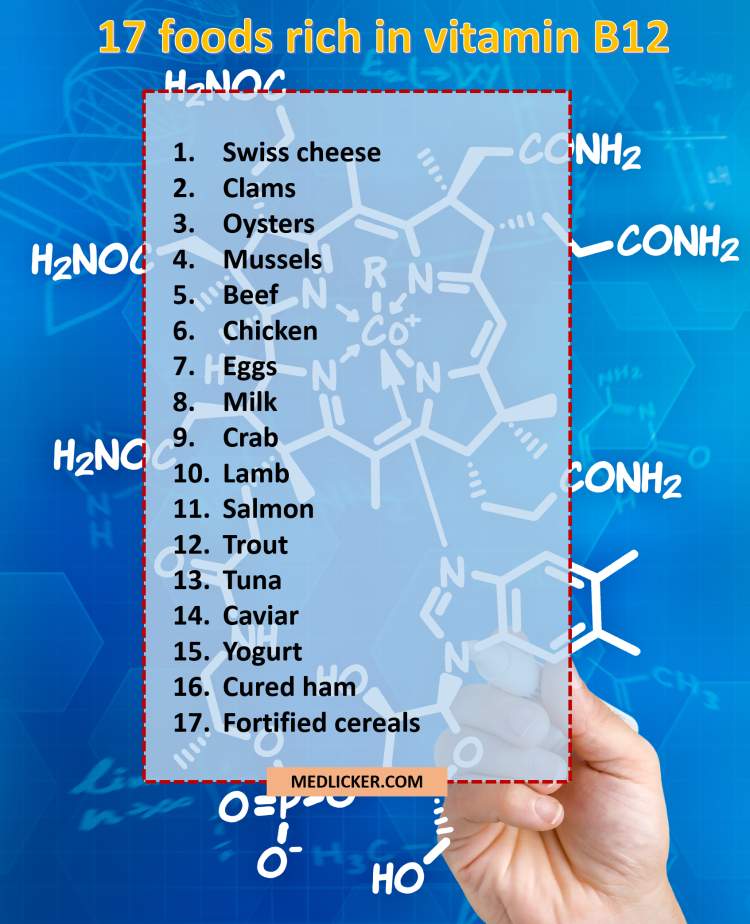
Foods rich in vitamin B12
If you are on an "average" diet you do not have to worry about vitamin B12 intake as it can be found in most ordinary foods you eat.
However if you do not eat enough animal products (e.g. are a vegan or vegetarian) you should be very careful and watch your daily vitamin B12 intake.
Ask your doctor for advice if you are a vegan or vegetarian.
The physician may recommend taking vitamin B12 supplements.
| Written by: | Michal Vilímovský (EN) |
|---|---|
| Education: | Physician |
| Article resources: | See numbered references in the article. |
| Image resources: | AdobeStock |
| Published: | March 9, 2017 at 11:20 AM |
| Next scheduled update: | March 9, 2019 at 11:20 AM |
Get more articles like this in your inbox
Sign up for our daily mail and get the best evidence based health, nutrition and beauty articles on the web.

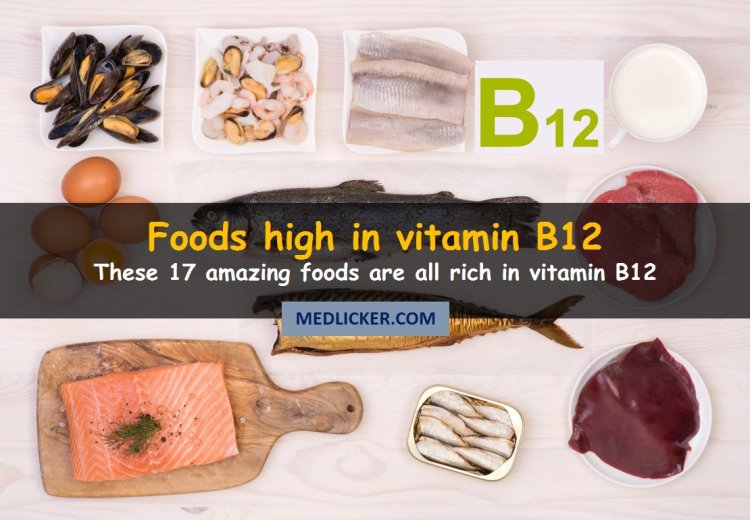
Ache in left arm that you should not ignore
Alkaline water dangers: why you should not drink it
How to Avoid Sleepiness While Studying?
23 Foods That Increase Leptin Sensitivity
Low dopamine (e.g. dopamine deficiency): causes, symptoms, diagnosis and treatment options
Swollen taste buds: the ultimate guide to causes, symptoms and treatment
Thin endometrial lining: causes, symptoms, diagnosis and treatment
Pimples inside nose: the complete guide
Holes in tonsils: definition, symptoms, treatment and prevention
How to deal with an ingrown hair cyst
Allegra vs. Zyrtec vs. Claritin
Allergy to penicillin and alternative antibiotics
How to get rid of phlegm (excessive mucus) in throat? Detailed guide to medical and home remedies, symptoms and causes
What causes stomach ache after meals?
Liver blood test results explained